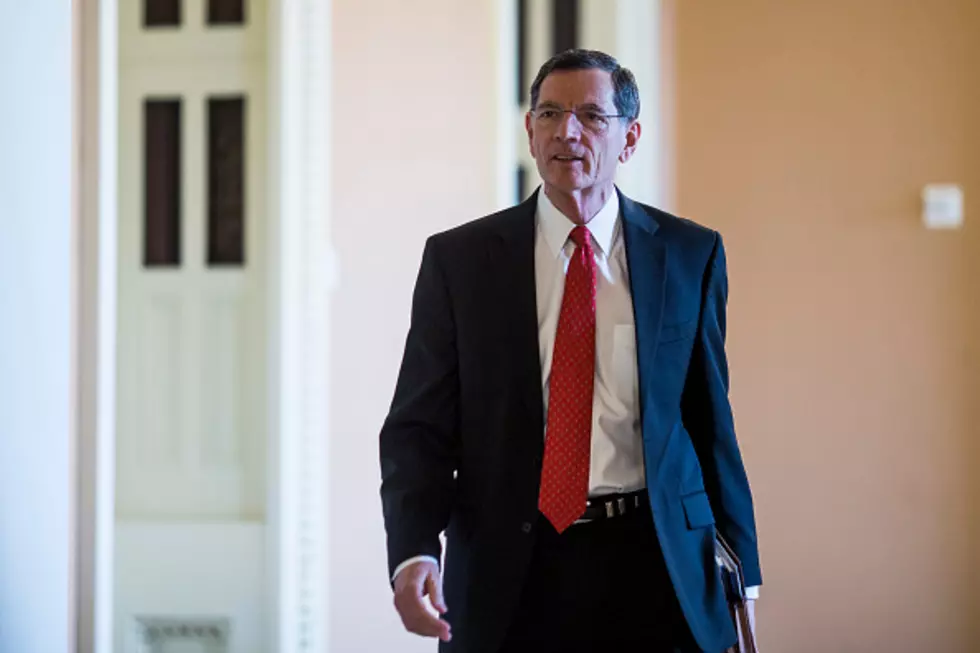
Barrasso Says Biden Wants to Give IRS ‘More Power to Spy on Americans’
Amid a controversial proposal by the Biden Administration to direct the IRS to collect additional data on bank accounts that see more than $600 in annual transactions (later changed to $10,000), Republican Senators were quick to take the idea to task.

Senator Barrasso of Wyoming was one of those people. Barrasso, speaking at a Republican news conference, said that President Biden made this proposal so that the IRS could spy on us.
"Joe Biden wants to give the IRS more power to spy on Americans," Barrasso said. "That's what he's asking for. Just listen to the testimony of his Secretary of Treasury who comes to congress and says she wants to look into the checking accounts, banking accounts of anybody with deposits or withdrawals $600. Republicans are committed to stopping this."
Barrasso said that President Biden wants to increase the size of the IRS budget by $80 billion.
"The Secretary of Treasury wants to hire with that money an army of IRS agents to look into the banking and checking of Americans, and basically everyone will be caught in the dragnet," Barrasso said.
He then proposed the rhetorical question: why do they want to do this?
"They want to squeeze more dollars out of hardworking tax payers in order to pay for their reckless $3.5 trillion tax and spending proposal," Barrasso stated, unsurprisingly. "It is the number one thing that I heard about in Wyoming last week. It's the number one thing that I heard about in letters in the last couple of weeks since this proposal was announced by the Secretary of Treasury and this Biden Administration."
President Biden and his Secretary of Treasury, Janet Yellen disagree. The Treasury Department put out a fact sheet which stated that the goal of this proposal is to ensure that wealthy Americans are paying the appropriate taxes.
"The only way to ensure that upper-income taxpayers pay what they owe is by giving the IRS the resources and information required to close the tax gap," the fact sheet stated. "The Administration’s compliance proposals will do just this by providing a bit of additional information and making transformative investments in the IRS, such as hiring enforcement agents who are trained to pursue tax evasion by sophisticated, upper-income taxpayers."
After initial criticism from Republicans and banking industry representatives, the administration opted to raise the threshold to those with more than $10,000 in annual transactions. According to ABC News, the administration, as well as Senate Democrats noted that any income received through a paycheck from which federal taxes are already automatically deducted will not be subject to the reporting. They also stated that recipients of federal benefits like unemployment and Social Security would also be exempt.
"Imagine a taxpayer who reports $10,000 of income; but has $10 million of flows in and out of their bank account," the fact sheet noted. "Having this summary information will help flag for the IRS when high-income people under-report their income (and under-pay their tax obligations). This will help the IRS target its enforcement activities on those who are actually evading their tax obligations—decreasing costly and burdensome audits for the vast majority of taxpayers who pay what they owe."
Regardless, Barrasso says this proposal is immoral and unethical.
"It's an invasion of the privacy of the American people," he said. "And second, when I talk to the people who work at the banks and the credit unions, they say this would de facto turn them into employees or agents of the IRS. They don't want anything to do with it."
Barrasso did not mention which bank or credit union employees he actually spoke to, but he did say that he "heard from people all around Wyoming that the IRS is already he least accountable and most powerful agency of the government."
Barrasso said the people he's spoken to say that the IRS is already irresponsible with their personal account information.
"The IRS does have a track record of targeting specific groups they don't like politically, and Republicans are committed to stopping this very scary proposal dead in its tracks," he said.
Code Of The West: Wyoming State Code of Ethics
More From Wake Up Wyoming









